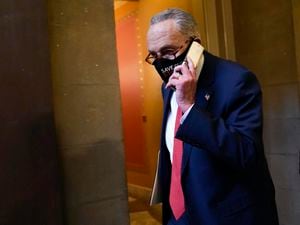US lawmakers reach deal on huge Covid-19 relief package
The agreement delivers extra help to businesses and individuals and provides money to deliver vaccines across the US.

Capitol Hill negotiators have sealed a deal on an almost 1 trillion dollar Covid-19 economic relief package.
The agreement delivers extra help to businesses and individuals and provides money to deliver vaccines across the US.
The agreement, announced by Senate leaders, would establish a temporary 300 dollar per week supplemental jobless benefit and 600 dollar direct stimulus payments to most Americans, along with a new round of subsidies for hard-hit businesses and money for schools, healthcare providers and renters facing eviction.
The House passed the legislation on Monday evening, and a Senate vote that would send the bill to President Donald Trump appeared likely to follow.

The House would pass a one-day stopgap spending bill to avert a government shutdown at midnight on Sunday. The Senate was likely to vote on Monday too.
“There will be another major rescue package for the American people,” Senate Majority Leader Mitch McConnell said in announcing the agreement for a relief bill that would total almost 900 billion dollars.
“It is packed with targeted policies to help struggling Americans who have already waited too long.”
A breakthrough came late on Saturday in a fight over Federal Reserve emergency powers that was resolved by the Senate’s top Democrat, Chuck Schumer of New York, and conservative Republican Pat Toomey of Pennsylvania. That led to a final round of negotiations.
The final agreement is the largest spending measure yet. It combines Covid-19 relief with a 1.4 trillion dollar government-wide funding plan and lots of other unrelated measures on taxes, health, infrastructure and education.
Passage is nearing as coronavirus cases and deaths spike and evidence piles up that the economy is struggling.
It would be the first significant legislative response to the pandemic since the 1.8 trillion dollar CARES Act passed virtually unanimously in March.
The legislation was held up by months of dysfunction, posturing and bad faith. But talks turned serious last week as lawmakers on both sides finally faced the deadline of acting before leaving Washington for Christmas.





